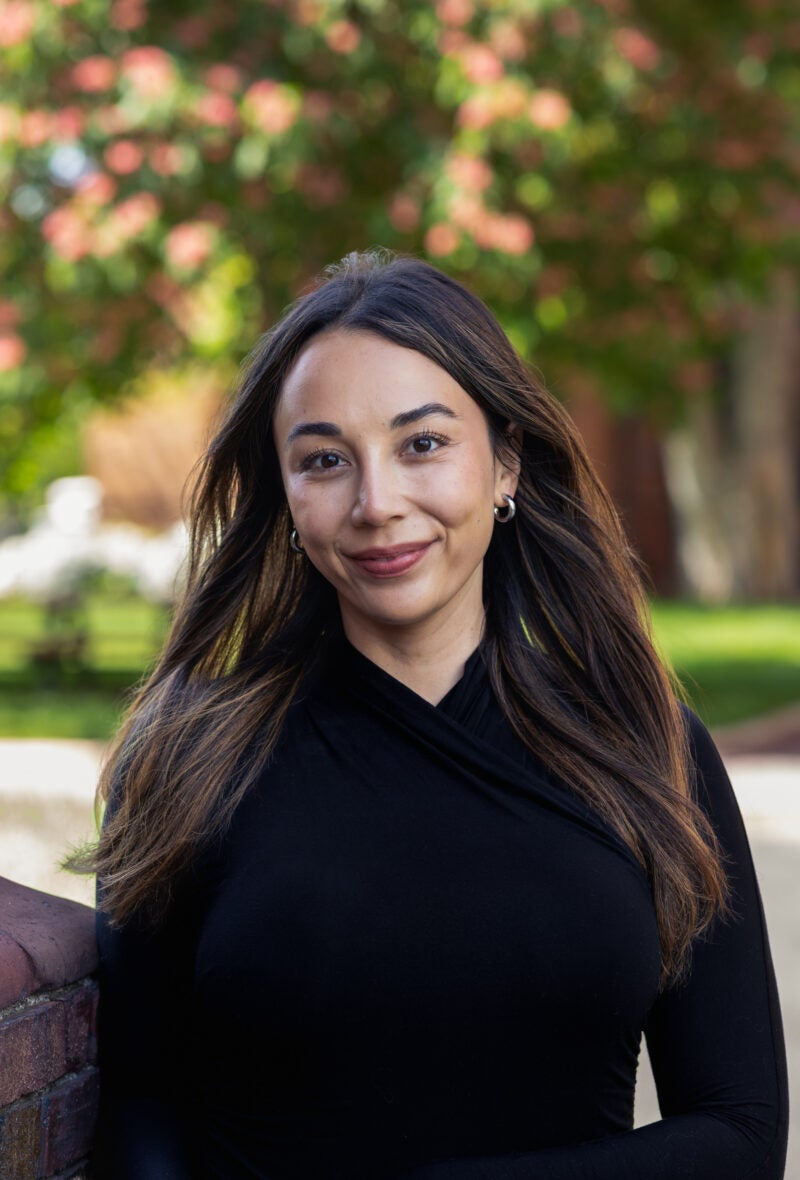When Katie Angel first came to Harvard Law School, she felt like she’d stepped into the movie “Legally Blonde,” even with the wrong hair color.
“I’m from California, I was in a sorority at USC, and I did my Harvard interview with my Chihuahua on my lap,” she recalled. “We each had our own unique path to HLS, but I quickly realized my style was different. I just didn’t fit the mold. So, I decided to do Harvard the Elle Woods way,” referring to Reese Witherspoon’s character in the film. “I chose both connection and performance, but always community over competition. I found that being authentic was actually a superpower.”
“If I’m Elle Woods, it’s not because I brought pink to Harvard,” she said. “It’s because I brought tenderness where it wasn’t necessarily expected. Well … and some pink, too.”
Just as Elle Woods wound up flourishing as a student and lawyer, Angel now graduates as a much-admired member of the Harvard Law community. She is this year’s winner of the David Westfall Memorial Award, presented annually to a graduating student to recognize contributions to creating community within the first-year section and class. Classmates have praised her skills as a mentor and community builder, and the empathy she’s shown in getting first-year students through the rougher patches. One classmate even suggested that Angel’s surname was no mere coincidence.
A first-generation American, Angel was raised by a single mother who’d emigrated from the Philippines. “My blueprint for leadership was my mom. She led with care, something I realized wasn’t just admirable — but was also necessary.”
Before attending Harvard, she double majored in political science and communication at the University of Southern California, graduating summa cum laude in three years. But she said that her real education came outside the classroom. During semesters and summers she worked on political campaigns, and upon graduation, she was hired by the Biden 2020 campaign, helping to raise more than $100 million on the California Major Donor Finance Team. “The best mentors in politics taught me that you don’t just advocate for a cause; you build coalitions. That sense of strategic empathy is at the core of everything I do now.”
Despite this impressive background, she said she felt insecure during her first year of law school.
“It was intimidating at first: the intensity, the pressure.” A turning point came when she took her first class with Maureen (Molly) Brady, the Louis D. Brandeis Professor of Law, who became a mentor and an inspiration. “She saw me truly and saw me fully. And she trusted me — first in my 2L as her teaching fellow and research assistant, and then in my 3L as the head teaching fellow for her 1L Property course. Her belief in me became the foundation I built on. Professor Brady showed me that real warmth and genuine care go hand in hand with excellence and success.”
Angel devoted her energy to giving back to the community, both in formal mentorship situations and more informal social ones. “At HLS I cultivated my own kind of community. I built relationships across divides in places that didn’t always look official: late-night chats at Cambridge Common, group texts and memes, walks home from the library. I’ve found that the best kind of communications happen outside the bullet points on a resume and inside tiny touchstones of warmth.”
She proved a natural networker, making friends with students from different corners of the law school community, whom she could then introduce to each other.
“I’ve found that making communities across differences actually makes all the difference, especially in today’s divisiveness,” she said. “One of the 1Ls I mentored said something that stayed with me: ‘You don’t make me feel like I have to be anyone else to succeed here.’ That to me is the heart of mentorship. It isn’t just about teaching; it’s also about witnessing, reminding someone they already have what it takes.” And she said that casual fun times matter as well. “When people feel safe and valued, they bring their best ideas, their real selves, and that’s where innovation and true collaboration begin.”
She said receiving the Westfall prize feels especially meaningful because it recognizes an approach to leadership that’s about impact, not just titles. “This isn’t just a prize; it’s a promise: that care counts, that someone who can shift the feeling in a room — who can make it warmer, more open, more human — leaves a legacy just as lasting as someone who commands that room through status or power. Leadership is about how you show up for others, not about what shows up on your resume.”
The award, she said, “means the world to me because it recognizes something that’s easy to overlook in the legal field: Community isn’t just a buzzword, it’s a lifeline.”
After graduation, she plans to return home to Los Angeles and work in entertainment law, continuing her law school interest in intellectual property and cyberlaw. But she will also be taking her mentoring experience with her. “Everything I’ve done at Harvard — building bridges, mentoring across differences, making space for fun and friendships in serious places — directly shapes the lawyer I want to be. In law, as in life, earning trust, creating coalitions and making people feel seen aren’t just ‘soft skills.’ They’re the very foundation of meaningful contribution and lasting change. In a world that’s never been more divided, I believe the ability to build genuine community is the rare, and most necessary, professional skill.”

View full coverage from the festivities of the 2025 Class Day and Commencement Ceremonies at Harvard Law School
Want to stay up to date with Harvard Law Today? Sign up for our weekly newsletter.
